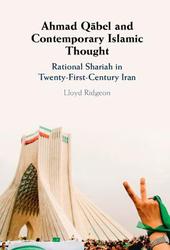
|
Ahmad Qabel and Contemporary Islamic Thought: Rational Shariah in Twenty-First-Century Iran
Hardback
Main Details
| Title |
Ahmad Qabel and Contemporary Islamic Thought: Rational Shariah in Twenty-First-Century Iran
|
| Authors and Contributors |
By (author) Lloyd Ridgeon
|
| Physical Properties |
|
| ISBN/Barcode |
9781009322225
|
| Audience | |
|---|
| Illustrations |
Worked examples or Exercises
|
|
Publishing Details |
| Publisher |
Cambridge University Press
|
| Imprint |
Cambridge University Press
|
| NZ Release Date |
30 April 2023 |
| Publication Country |
United Kingdom
|
Reviews'This absorbing, carefully researched book provides an unparalleled account of the life, legacy, and intellectual development of Ahmad Qabel. Drawing on an array of primary sources, Lloyd Ridgeon has demonstrated a high level of mastery, adding immensely to our understanding of the religious reform movement.' Naser Ghobadzadeh, Australian Catholic University 'Ahmad Qabel was one of the most daring dissident Islamic jurists of post-revolutionary Iran. Prominent but unable to publish in Iran, virtually unknown outside his country. The first systematic study of Qabel's ideas and writings, Ridgeon's excellent, engaging exposition locates them in the context of Iranian reformist thought within the clerical intellectual tradition.' Ziba Mir-Hosseini, SOAS, University of London 'This book, tracing the lesser-known trends in contemporary Iranian intellectual history, stands out as an original inspiration to give a relatively obscure jurist-reformer an honorary standing in the line of influential jurists of Iran. Ridgeon makes it self-evident that Qabel deserves to be introduced to the Western audience as one of the most serious religious voices of young reformers.' Abdulaziz Sachedina, George Mason University 'Lloyd Ridgeon has brilliantly captured the thoughts of Ahmed Qabel, a reformist Muslim thinker who has received scant attention in the West. Qabel's views on the rationalist Shariah are especially illuminating and compelling. The book will be of great benefit to all scholars of contemporary Islam, especially those interested in an Islamic reformation.' Liyakat Takim, McMaster University
|